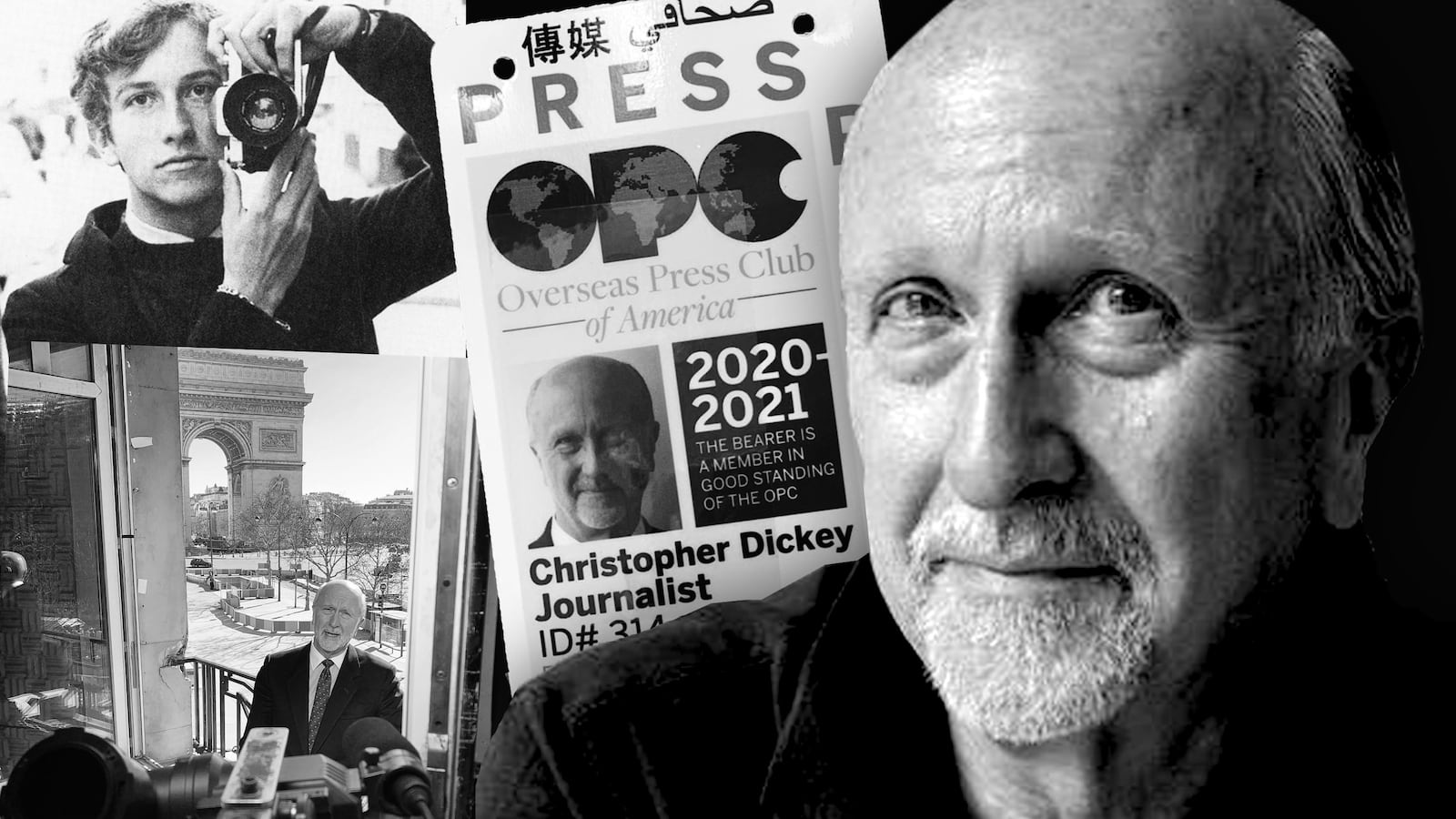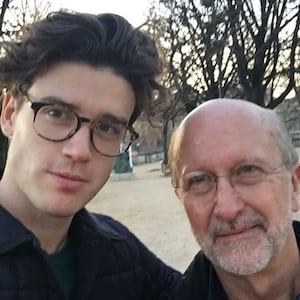The hardest thing about writing an obituary for Chris Dickey, the legendary foreign correspondent and my friend and colleague for nearly 25 years, is not having him edit it. He would have invariably found a better way for me to clumsily try to express how truly inspirational he was to a whole generation of journalists he wanted only to see succeed. Or he would have surely wanted just a little bit more focus on his heroic past as a war correspondent, or to point out how great a grandfather he was, which was a surprising new role for him that he thoroughly embraced. We would have likely argued about finer points and then agreed that he was right.
Writing this without the crutch of knowing he’ll just smooth out the rough parts is truly difficult in so many ways. Chris, The Daily Beast’s foreign editor, died suddenly in Paris at the age of 68. He is survived by his beloved wife Carol, his son James, three grandchildren and his sister Bronwen and brother Kevin.
I met Chris in 1997 when he was the Paris editor for Newsweek Magazine and I was a new hire in Rome. We covered a lot of Italy stories together and he would come to Rome and meet high-level sources and diplomats he happened to know here on the side of whatever else we were doing. When we covered the CIA’s capture of an Egyptian cleric off of a street in Milan, I was chasing down phone numbers while he was already having an aperitivo with the source I was trying to track down. “Yes, I’m sitting here with Chris,” I recall an Italian secret service agent telling me on one occasion when I finally got the number. I could hear Chris chuckling in the background. “We’ve been waiting for you to call. Why don’t you meet us?” That was classic Chris, a great writer and skilled editor, but he was truly the best beat reporter I ever met — friends to spymasters and sheikhs, cardinals and cops, insurgents and intellectuals — and all he ever wanted was for anyone he mentored to try to beat him to a source.

Chris reporting near the Arc de Triomphe in Paris.
Courtesy Chris DickeyAmong the most memorable stories we covered together were interviewing Italian Prime Minister Silvio Berlusconi, whom he secretly admired, in his palatial palace in Rome, and covering the death and funeral of Pope John Paul II and the election of Benedict XVI, the latter of which is when I can say I truly met him. He had done a TV appearance for Fox News on the legacy of John Paul II and they had neglected to put filters on the lights and literally burned his corneas. He called me at 2 a.m. and apologetically asked me to come to his hotel room to take him to the emergency room.
As a junior reporter to a senior I barely knew, I did what I was asked and drove to his hotel room to help him navigate his new—and luckily temporary—blindness. I helped him get dressed and then walked him to my car and drove him to the emergency room where we sat all night until he could be seen by a doctor. They dressed his eyes in bandages and showed me how to change them. I took him back, essentially put him to bed, and was there at dawn the next morning to change the dressing and take him back to the doctor. For the next few days I applied the salve to his burned eyes and changed the dressing and all the while, he told me story after story.
I remember the vivid details he shared about covering the Sandinistas, which led to his book With The Contras: A Reporter in the Wilds of Nicaragua. His stories were of a type of journalism that no longer seems to exist, in which reporters embedded with terrorists and secret forces for weeks at a time to produce a single article. And those articles of his were awe-inspiring.
During his blind spell, he felt like he would never see again and just wanted to talk, asking me to record him and take notes. We talked at length about what it was like to be the poet and novelist James Dickey's son and about the summer he was on the film set with Burt Reynolds when they filmed Deliverance, which his father wrote. He had just written his memoir Summer of Deliverance and the stories were raw, and he was honest about the pain of his father’s genius and his mother’s demons. Every year, he commemorated his mother’s tragic death, which I sensed haunted him in ways he never fully shared.

James Dickey and Chris
Courtesy Chris DickeyThere are few more bonding moments than something like temporary blindness with a stranger, and he was grateful for the help until, as it would happen, the day he died. We spoke on the phone the morning of the day he passed away (a term he hated, and would have never allowed in an obituary, instead asking: where do they pass away to? Which is why it is appropriate to include it here).

He was a grateful man, thankful for every person he met, every story someone told him, every article he was able to edit to perfection and for journalism as it was and to what it is evolving. But he was grateful to no one more than his wife Carol who undoubtedly suffered his thrill-seeking years when he risked life and limb to tell stories no one else would, and who was finally getting a chance to enjoy him with fewer distractions.
A week before he died, Chris hosted a Zoom interview for Beast staff with Erin Banco, an amazing journalist whose own trajectory in foreign news is not so different from his own. Prior to being asked to interview Erin, he and I had discussed at length how great it was to have these off-the-record chats with peers, which I had just been part of as an interviewee. He had said he hoped not to be asked to talk, though, because no one would want to hear his old war stories. So when the editors wrote to ask him to interview Erin rather than be interviewed himself, he called me right away. "See, no one wants to hear old stories," he said. I beg to differ.

The Daily Beast editors Will O'Connor and Chris Dickey.
Courtesy Chris DickeyChris started his career at The Washington Post as a book review editor. Later, as a foreign correspondent covering the bloody guerilla war in El Salvador, he got to know Joan Didion, who would be his mentor and confidante and with whom he would spend long hours in Central Park discussing his writing and the problems with the world. Chris covered every war and conflict from Central America to Iraq, from the 1960s until the 1990s. He and Carol lived in Cairo, Egypt, from where he would hop from one hotspot to another until they finally decided that Paris would be their full-time base in the 1990s. His portraits of Paris on social media are better than any postcard, and just this month he decided to dust off an old film camera, with which he recently started posting evocative shots. One of his last, posted a few hours before he died, was of a young woman walking her dog in Paris:
Chris published seven books including novels Innocent Blood and The Sleeper. After the terrorist attacks on Sept. 11, when he happened to be in New York, he wrote Securing the City, which would later be described as the definitive account of the New York City Police Department during that era. His latest book, Our Man in Charleston: Britain's Secret Agent in the Civil War South, was a New York Times bestseller and he was on the final chapters on a follow-up.
When The Daily Beast and Newsweek merged, he was concerned that the old style of journalism that had served his style so well was soon to die. But he embraced new media and became one of The Daily Beast’s most notable voices, capturing everything from the nuances of French culture to what he felt was the demise of America under a similar style of leadership he had covered in dictatorships around the world.

I messaged with him about an hour before he died suddenly in Paris Thursday night. He wrote back from his phone that he had “multiple distractions” and was “out on the street” but had managed to rearrange a few things on what will be the last of the thousands of pieces he has brilliantly edited, “to make it more clear.”
It is through tears that the entire Daily Beast team says good-bye to our friend and colleague who has enhanced all of our lives for the better. Chris, without you the world is a less curious, less brilliant, and poorer place. We will never forget you.


